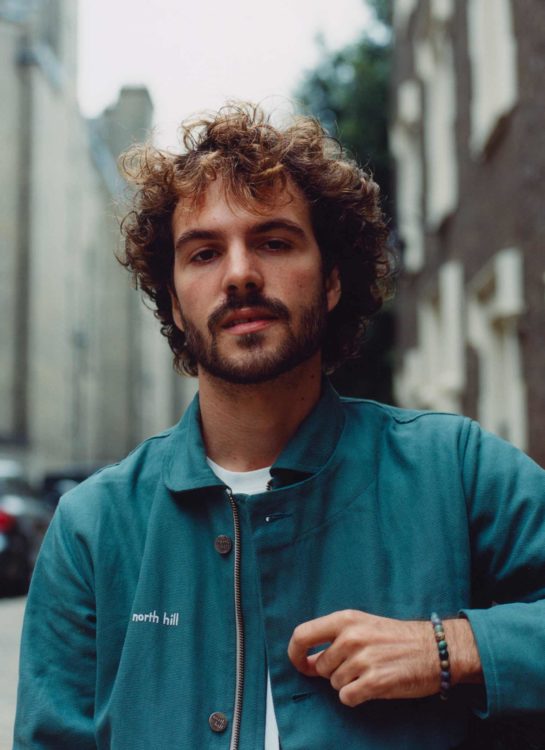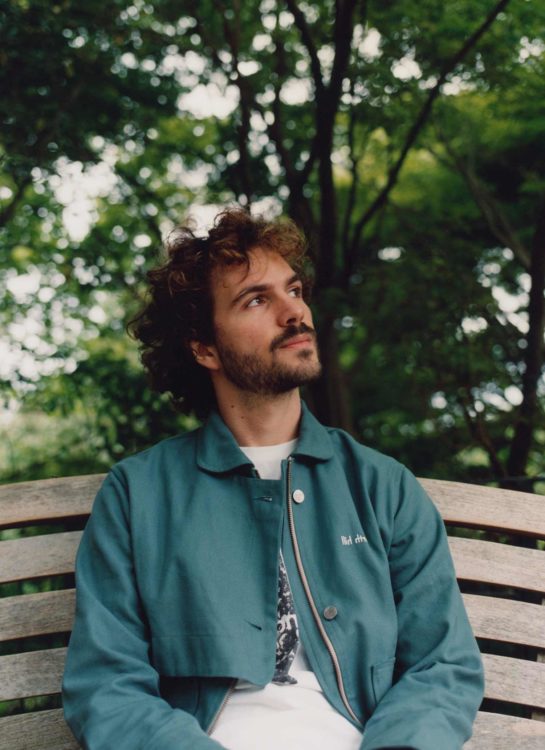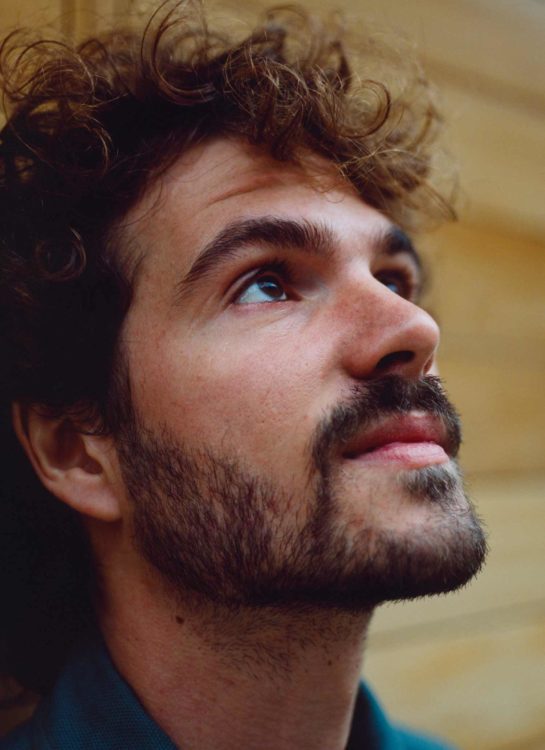- Words Amelia Yeomans
- Photography Alex Rorison
- Production Studio Notion
Ahead of the release of his second studio album, FKJ reveals the circumstances that inspired the new record and why being vulnerable doesn’t scare him.
Renowned as an innovator in the New French House genre, French Kiwi Juice is now gearing up for his most revered release yet. Said to signify a rebirth in FKJ’s music, both as a producer and songwriter, his second album “V I N C E N T” features killer collaborations interlaced with intimate lyricism and mesmerising vocals that prove why FKJ is the master of his field.
Written entirely from FKJ’s home studio in the Philippines, and with the threat of lockdown looming, “V I N C E N T” was born from total solitude. But with this isolation came the freedom to experiment without boundaries, resulting in an expressionistic and revealing album that is almost undefinable.
““V I N C E N T” is an album about my kiddo innocence that I want to latch on to,” FKJ explains. “The opening song “Way Out” is an invitation to leave my busy adult mind. I put these footsteps and door sounds on the intro because I was imagining this scene of an exit, running away from a too serious and anxious state of mind. The escape would end and I would land in a childish world where the kid inside of me that doesn’t care and just plays would re-emerge.”
The lead single from the album, “A Moment of Mystery” featuring Toro y Moi, is a further signifier of the genuis to come. Featuring jazzy piano riffs, wistful synths and buttery-smooth vocals, there is no better demonstration of what FKJ has to offer. Following the unwavering success of his self-titled 2017 album, we would expect nothing less. Ahead of “V I N C E N T”’s release on 10th June, we spoke to FKJ about childhood, overcoming perfectionism, and the therapy of song writing.


You’ve collaborated with some incredible artists on this record, like Toro and Little Dragon. How do your collaborators influence your sound? Do you find that these tracks differ thematically from tracks you create alone?
Well, it depends. It depends on the process because for Toro, it was like a life process. We made the track together completely. There was no initial ideas when I came in the studio with Toro. It was all improvised. We improvised for like a day or two non-stop in the studio. And then from these long improvisations we picked up a few ideas that were finished and ‘A Moment Of Mystery’ was one of them. Whereas for Little Dragon, I had the initial idea already, and she added to it. But the sound of the track was already was really pretty much zero when you compare it. When you compare the demo to the original, it was like, yes, 80, 90% of it was was already in there. So it really depends on how I’m collaborating. Same for Santana. Santana added to the track. This track was really already made. So it really depends on the on the initial process, if it’s a pure collaboration or if it’s more of a feature. Because Toro I feel like for us was a true collaboration. Whereas Santana or Little Dragon was more of a feature to the song.
You named this record after yourself. Does this record feel significantly more personal than your previous ones?
Oh, I wouldn’t say that particularly. No, it’s not really the reason why I call this album my name. I don’t think it’s it’s like more (personal) than the other ones, I think. I think ‘Ylang, Ylang’ was very personal too. It was a very personal one, but I would say that the name is just a reference to my childhood and what the theme of the album is about. I almost called this album ‘Lost Innocence’ because it was really the theme of the album. And then I decided to switch to Vincent because I thought it was just more simple and powerful to call it the name that was given to me when I was a kid.
How does the sound of Vincent differ to your previous releases? What do you think you’ve captured with Vincent that you may not have done previously?
Oh, well, it’s difficult to call it a sound because the context of it was just very particular. It was two years in quarantine in the studio, really, just like creating in the middle of this this very luscious environment around me. It was three years without much social interaction and far away from the nightlife and far away from concerts. So it was really like a kind of like a loner music soundtrack of me alone in that environment. And so it’s definitely more calm, more contemplative. It’s really an album that you kind of listen to very comfy in your sofa and just blast the speakers on, rather than like at a show or at a club. I’d say, in terms of composition, it’s probably the most polished, in terms of a structure and arrangement. It was maybe the most thought out, which is kind of contradictory to the theme of the album, which is trying to get back to my lost innocence. But that’s why I like to call this album a kind of transition where I was kind of into the more intellectual and thought out way of making music and being conscious of that and trying and wanting to go back to way more raw and unpolished way of making music. And that’s where the lyrics came. I was into that space of making music in a very thought out way and wanting to kind of let it go. A little bit of the intellectual way adults make music and go back to a more childish way. And that’s where all the inspiration for the lyrics and the theme of the tracks and the visuals came from. I feel it was a necessary transition to make this album, to release it. And then it’s like a chapter. It’s like an important chapter of my career.
Is songwriting a therapeutic process for you? And which song off the record, did you find most therapeutic to write and why?
Yeah, it’s therapeutic because writing, just writing, not just writing lyrics, is therapeutic to me. Just like waking up and and if my mind is cloudy, I would just sit down and write a couple of pages of pretty much anything that comes to my mind. And it would just clear up things. And then from these notes, often a lot of sentences stand out. I would just use the sentences to write actual songs, like ‘Let’s Leave’. It’s probably the one that came most naturally and the one that is the strongest for the theme of this album. It really talks about about letting go of that overthinking, self-centred state of mind and to just have fun with my music and not think about it too much and let it just go naturally from me playing with my instruments. That’s what the song is really about: going to that childish state where you don’t think as much and you just let it out and accept it as it is.
Is childhood always something that you wanted to explore in your music, or did it come about due to your circumstances at the time of writing?
It came about. I didn’t really write about that before. So it was really about the circumstances at the time. Yeah. It was really what I needed to. It was what I had in mind and in my head all the time in a loop and and rather than it being a limit and something that would be a problem or be uninspiring, I decided to just talk about it in my music and just make it the actual album.
And the opening track ‘Way Out’ is about stepping out of your adult mind and leaving any anxiousness behind. Did you write this song intentionally to be a transition? Taking the listener with you into the world of Vincent?
Yeah. It’s really the goal of making this image of this world that I’m jumping in and out of. And the album is first try going out of my mind, and then second, try going back in and, then on like third track, try going back out. It’s kind of like that in and out, but it’s inviting, at least for the whole first track, the listeners can leave that state with me because we all have that childish state inside of us and and an adult state that sometimes are battling with each other.
The ‘Way Out’ video came about after you discovered an abandoned attraction park. Are the visuals that you pair with the song an important part of your creative process? And was it important to you that the song was represented visually as you had imagined it?
Yeah. I don’t like to just put visuals for just visuals. Even if the meaning is very simple, I always pair the tracks with visuals that mean something and or symbolise something.



Do you think that comes from your early days of working with film?
Yeah, for sure. It’s definitely influenced it over these years of just digging into movies. Just learning about composition, learning about different directors, learning about screenplay, about lighting. Yeah, everything. And during quarantine, I definitely geeked out a lot more on filmmaking, even though I was doing it already. But it took another dimension also because I was here, far from everything. We made this video with two people on the shoot. It was just me and my friend Terrence. It was totally DIY. So it was very interesting to be in that situation where I couldn’t call the team and couldn’t have really many people on board to shoot. But just figuring out really – it was super. There was a lot of growth there for sure.
Do you feel the same personal attachment to tracks you produced for other artists as you do for your own?
Well, I didn’t really produce many tracks for other artists to be honest. I would say, when I don’t write the meaning of the song, it turns into a different meaning, it turns more into the singer’s song and what they’re going through. I feel also that for a track I have a feature on, I feel that it becomes equally or even more their song, even if it’s on my project. So yeah, I would say that when I produce, or when I have a feature on my music, we kind of share the meaning now and I’m not like appropriating the entire song anymore. I would say that I feel more and more of a personal connection to my own songs. Yeah. Makes sense.
And you’re playing a lot of festivals this summer. Which song from the record do you think crowds would spend best to and played live? And why?
Probably, probably ‘Let’s Live’, because it’s just the most up-tempo track of the album. And for festivals especially, I think this one is the one that can translate best. But ‘Different Days’ can be so powerful because of that very intense drop it has. Yeah, I’m excited to play this one too in festivals in those massive sound systems.
Why was overcoming your perfectionism such a crucial step in creating Vincent?
Because I don’t think perfectionism is a good thing. I mean, to an extent, everything is bad when you abuse it. Perfectionism at some point is too, from my experience and from what I do, perfectionism becomes a waste of time at some point. It’s just a waste of time. And time is precious.
Procrastination in a way?
I wouldn’t say procrastination because even if I have so many other ideas and things to do, I’m still a perfectionist. I am never out of ideas and never out of new things to experiment and try. But the fact that I’m a perfectionist just puts all these ideas that are waiting on pause. Yeah. So I don’t know if it’s really a procrastination of making them because I really want to make them. It’s more like an obsession for thinking too much and maybe an unconscious fear of what people would think. Yeah. So it’s definitely part of that building, that conditioning, that growing up phase, that becoming an adult phase, because you don’t feel these things when you’re kid. You don’t care as much. You don’t care at all about being a perfectionist. You don’t care what people are going to think about you. So, yeah. It is totally what inspired the album and I just needed to talk about it.
So which song off the record do you think listeners will resonate with the most and why?
That’s a tough one. I don’t know because every time I send the album to someone, they have a different favourite. So it’s really difficult to say which one. I can’t really pick. So, I don’t know!
If there is one message that listeners take away from Vincent. What would you want it to be?
Well. One message that they would take away from it I think would be more of a feeling. I just wish they would kind of stop with whatever work they’re going through, whatever things they have to do, and just sit with the music and not think of anything else and just be present with it. It’s not really the message, but I hope they get this feeling and that they would stop everything they’re doing, everything that they today have on their mind, all the piles of work they have to do, just whatever’s making the mind busy and cloudy. I just hope they will get out of it.
Vincent is a very personal record about childhood innocence. Does it feel at all daunting to share this with the world?
No, not at all. I think it’s important to just be honest and to not pretend that everything is always good and everything is always easy. I’d just like to be honest and to be real, like ‘okay, yeah. These are the challenges I had to go through during this period of time when I made this album’. I feel it’s like a necessary step. If I keep it and don’t release it, then it’s always going to be there. And I’m not going to challenge it. But if I let it out, then I feel like it’s a progression and it’s going somewhere. I’ll feel it’s working, you know, it’s really working.



